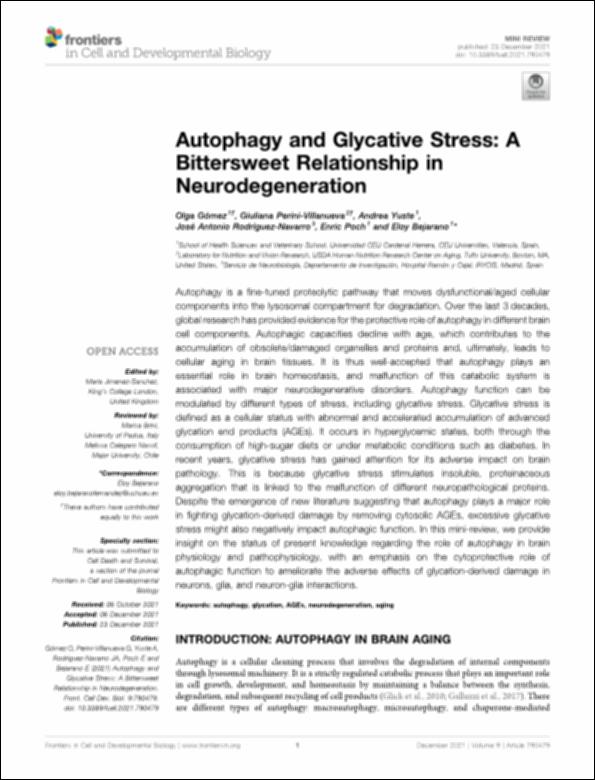Por favor, use este identificador para citar o enlazar este ítem:
http://hdl.handle.net/10637/13646Autophagy and glycative stress : a bittersweet relationship in neurodegeneration
| Título : | Autophagy and glycative stress : a bittersweet relationship in neurodegeneration |
| Autor : | Gómez Roda, Olga Perini Villanueva, Giuliana Yuste Rivero, Andrea Rodríguez Navarro, José Antonio Poch Jiménez, Enric Bejarano Fernández, Eloy |
| Materias: | Sistema nervioso - Degeneración.; System nervous - Degeneration.; Oxidation, Physiological.; Oxidación biológica.; Developmental biology.; Cells - Aging.; Células - Envejecimiento.; Biología del desarrollo. |
| Editorial : | Frontiers Media |
| Citación : | Gómez, O., Perini-Villanueva, G., Yuste, A., Rodríguez-Navarro, J. A., Poch, E. & Bejarano, E. (2021). Autophagy and glycative stress: a bittersweet relationship in neurodegeneration. Frontiers in Cell and Developmental Biology, vol. 9, art. 790479 (23 dec.). DOI: https://doi.org/10.3389/fcell.2021.790479 |
| Resumen : | Autophagy is a fine-tuned proteolytic pathway that moves dysfunctional/aged cellular components into the lysosomal compartment for degradation. Over the last 3 decades, global research has provided evidence for the protective role of autophagy in different brain cell components. Autophagic capacities decline with age, which contributes to the accumulation of obsolete/damaged organelles and proteins and, ultimately, leads to cellular aging in brain tissues. It is thus well-accepted that autophagy plays an essential role in brain homeostasis, and malfunction of this catabolic system is associated with major neurodegenerative disorders. Autophagy function can be modulated by different types of stress, including glycative stress. Glycative stress is defined as a cellular status with abnormal and accelerated accumulation of advanced glycation end products (AGEs). It occurs in hyperglycemic states, both through the consumption of high-sugar diets or under metabolic conditions such as diabetes. In recent years, glycative stress has gained attention for its adverse impact on brain pathology. This is because glycative stress stimulates insoluble, proteinaceous aggregation that is linked to the malfunction of different neuropathological proteins. Despite the emergence of new literature suggesting that autophagy plays a major role in fighting glycation-derived damage by removing cytosolic AGEs, excessive glycative stress might also negatively impact autophagic function. In this mini-review, we provide insight on the status of present knowledge regarding the role of autophagy in brain physiology and pathophysiology, with an emphasis on the cytoprotective role of autophagic function to ameliorate the adverse effects of glycation-derived damage in neurons, glia, and neuron-glia interactions. |
| Descripción : | Este artículo se encuentra disponible en la siguiente URL: https://www.frontiersin.org/articles/10.3389/fcell.2021.790479/full |
| URI : | http://hdl.handle.net/10637/13646 |
| Derechos: | http://creativecommons.org/licenses/by/4.0/deed.es |
| ISSN : | 2296-634X (Electrónico) |
| Fecha de publicación : | 23-dic-2021 |
| Centro : | Universidad Cardenal Herrera-CEU |
| Aparece en las colecciones: | Dpto. Ciencias Biomédicas |
Los ítems de DSpace están protegidos por copyright, con todos los derechos reservados, a menos que se indique lo contrario.


